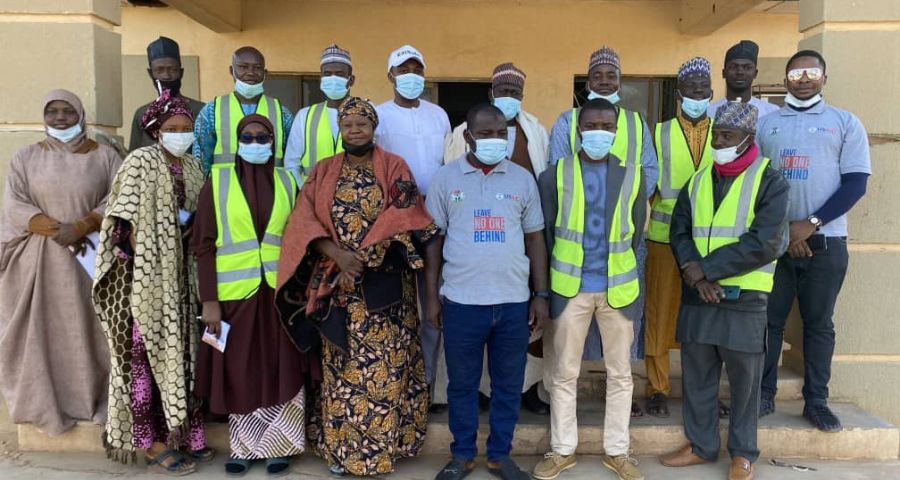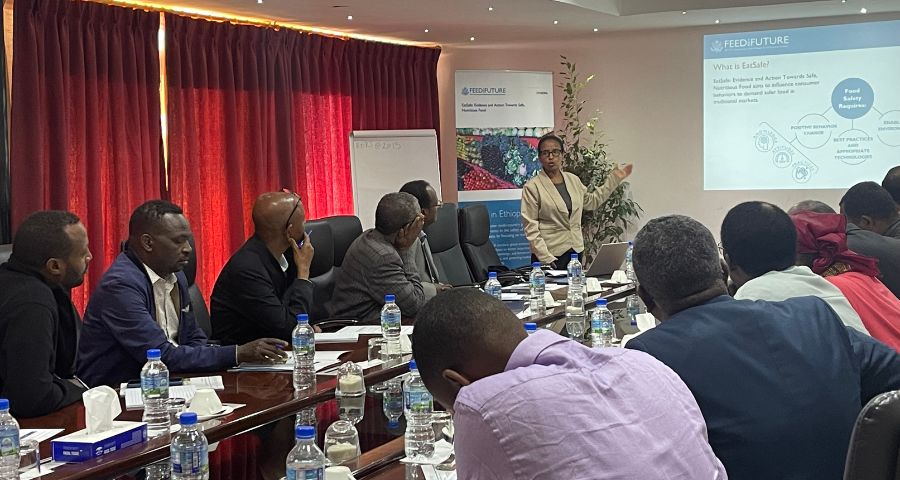Food safety in low- and middle-income countries (LMICs) is a complex challenge that cuts across almost every aspect of the food system — from supply chain businesses and traditional markets to public health, regulations, and consumers. This year’s World Food Safety Day reinforces the importance of food safety across our food system. Addressing complex challenges, like food safety, often requires working with a broad group of stakeholders with diverse perspectives and incentives. Recently, the USAID-funded, Feed The Future program, EatSafe: Evidence and Action Towards Safe, Nutritious Food (EatSafe), has leveraged a collective action approach to bring a diverse set of public and private actors together to address the challenge of food safety in traditional markets.
Collective action is “an intentional and agreed-upon process that engages interested parties to take joint actions in support of shared objectives or a shared issue” and can be considered a form of public-private partnership (PPP). While PPPs often focus on tangible agreements, collective action includes an emphasis on building social capital and trust between stakeholders. It’s the social capital—the connections between individuals and groups and the norms, trust, common values, and shared understandings on which these connections rely—that enable actors to identify common goals and work collectively to address systemic challenges. While formal PPP agreements often have an expiration date, the relationships and connections between local stakeholders fostered during a collective action engagement can last beyond a program’s lifecycle.
EatSafe aims to increase consumer demand for safer food in traditional markets. While the program focuses on consumers, EatSafe understands that they are but one stakeholder within a larger food system of actors that enable safer food. EatSafe is taking collective action approaches in two implementing countries, Nigeria and Ethiopia.
Formalizing Efforts for Safer Food in Nigeria

In Nigeria, EatSafe supported the formation and official registration of the Association for Promotion of Food Safety and Improved Nutrition (APFSAN). APFSAN convenes a multitude of stakeholders—from farmers to vendors, consumers, market actors, private sector, research and academia, professional associations, civil, faith, and community-based organizations, and governing representatives—to sustainably support a collective goal of safer food in traditional markets. To build social capital across these wide-ranging groups and organizations, EatSafe in Nigeria conducted a stakeholder analysis, met with market management groups and individuals to understand their interests, and obtained support from various political sectors.
After several months of stakeholder engagement, EatSafe united a core group of champions to work towards improving food safety and nutrition in traditional markets. EatSafe held trainings to improve individuals’ food safety capacity and included participants in the design of market interventions, creating both a common knowledge of the issue and joint ownership of improvement activities. The members agreed that the initiative should be a registered association at the national level to foster legitimacy and allow the opportunity for expansion to other states. Members of APFSAN are supporting EatSafe market interventions and providing resources and connections to relevant initiatives, such as the State Committees on Food and Nutrition, to raise awareness and support APFSAN’s collective goals.
Enabling Improvements for an Ethiopian Market
In Hawassa, Ethiopia, traditional markets do not often have governing structures or key responsible parties. Therefore, EatSafe employed a localized approach to collective action with a focus on one specific market, Aroge Gebeya. Leveraging results from a stakeholder analysis and relationships with the Hawassa Mayor’s office and Hawassa University, EatSafe launched the Market Improvement Initiative (MII) in May 2023. The MII’s objective is to bring together Hawassa city stakeholders and market actors to improve food safety through the development of a market improvement plan for the market. Without an organization responsible for the market, EatSafe designed the MII to convene interested parties from the city, foster social capital through collective pride for the market community, and focus efforts on the improvement plan.

While MII is still in its early stages, EatSafe is using trust-building exercises during its MII meetings to develop social capital. This includes sharing personal impact stories about their experiences with the market or with food safety and their families. The second MII meeting will take members to Aroge Gebeya market to contextualize discussed challenges. EatSafe will invite leaders from neighbouring countries to discuss successes and challenges in efforts to improve traditional markets. As motivation and trust amongst members grow, EatSafe will support the MII in developing a market improvement plan that may cover a variety of physical and/or social improvements, based on the stakeholders’ priorities. The relationships fostered within the MII can help support the advocacy for the improvement plan and engagement with influential public and private sector actors for investment.
EatSafe is using a collective action approach to create both formal and informal public-private partnerships to address food safety challenges in traditional markets. While APFSAN and the MII are contextualized to fit their unique environments, both are anchored in the understanding that social capital and trust amongst local stakeholders are needed to address complex challenges like food safety in traditional markets.
Related Resources
Headline Photo Credit: GAIN
Teale Yalch is the EatSafe Project Manager, Operations and Partnerships at the Global Alliance for Improved Nutrition (GAIN). Prior to working at GAIN, Teale completed her master’s degree at Duke University in International Development Policy where she focused her research on smallholder farmers and sustainable value chains in Africa. She also has experience working with small businesses in the private sector and was a Peace Corps volunteer in Guinea, West Africa where she worked in agroforestry.
This blog was made possible through support provided by Feed The Future through the U.S. Agency for International Development (USAID), under the terms of Agreement #7200AA19CA00010. The opinions expressed herein are those of the Global Alliance for Improved Nutrition (GAIN) and do not necessarily reflect the views of USAID or the United States Government.
For more information about EatSafe, visit www.gainhealth.org/EatSafe.
